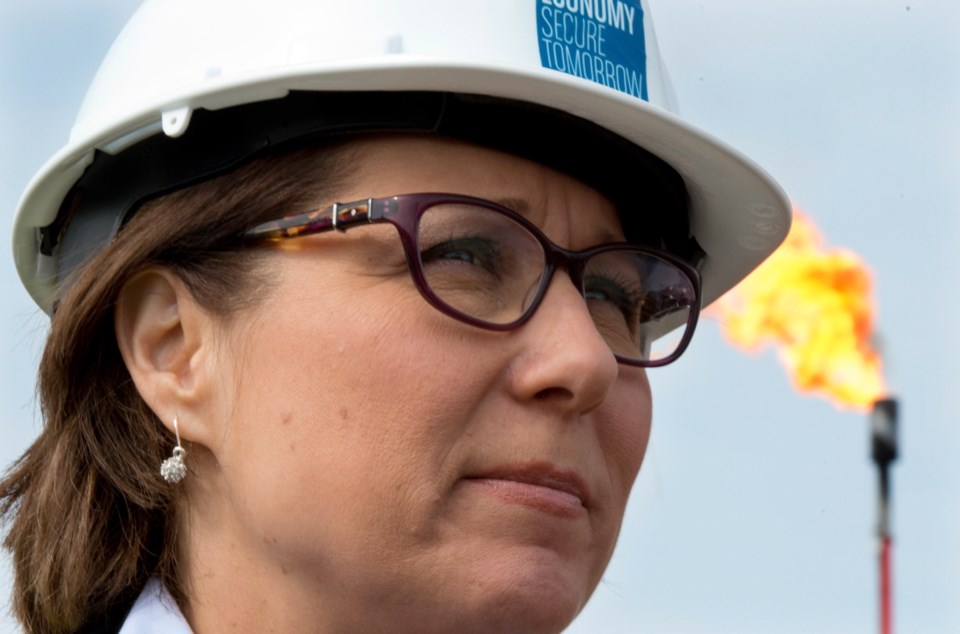 The liquefied natural gas pace is quickening as years of backroom work start getting unveiled, leading to a final investment decision by the lead proponent that could now be just months away.
The liquefied natural gas pace is quickening as years of backroom work start getting unveiled, leading to a final investment decision by the lead proponent that could now be just months away.
A complex royalty scheme was unveiled Wednesday that smooths out the government’s take over 23 years to ensure stability for the Pacific Northwest LNG project. It came at an all-hands-on-deck news conference by Premier Christy Clark, Pacific Northwest’s CEO Michael Culbert and assorted ministers.
Next up is legislation allowing for a project-development agreement with the company, which could come as early as this summer, in what would be a special sitting of the house. That bill will stipulate myriad other expectations of who will do what and when over the long term, if the Petronas-backed company commits to the $36-billion project. The agreement will be made public then. The bill would also underpin any future project development agreements.
Petronas got cold feet last year on costs and deferred the Prince Rupert area project indefinitely. But talks continued behind the scenes, leading to Wednesday’s impression of some fresh momentum.
Culbert said the energy sector has changed dramatically, but the LNG project was always a long-term play, so the stability in the royalty proposal is welcome.
Instead of coping with annual unpredictable changes in the rate charged for taking the public resource, the royalty plan covers a huge gas field in northeastern B.C. with a fixed, sliding rate for the next 23 years. It will bring in $7.7 billion in revenue, based on current forecasts at full production.
The company would have to meet escalating minimum production targets, or it would pay royalties regardless. It would have to spend $3 billion in the next six years on infrastructure.
There are also hedges built into the deal to protect both sides from price fluctuations.
The royalties, LNG income tax, carbon tax and others on one LNG facility (there are 19 on the drawing board) would produce revenues of between $500 million and $800 million a year, according to the government. Culbert said there’s still some heavy lifting, but called Wednesday an exciting milestone and said it was a good day for “stability, clarity and predictability.”
Elements of the project-development agreement that were released Wednesday protect the company from increases in taxes specific to the industry, such as the LNG income tax, a natural-gas tax credit and the carbon tax.
Future governments can’t be bound to hold those rates steady, but if there are hikes, the company can apply for compensation.
LNG is still far from a done deal. One specific hurdle that was glossed over is the Lax Kw'alaams First Nation’s opposition to the project, expressed by show of hands at a series of meetings this month. Much of the concern stems from an incursion on fish habitat by a jetty that’s part of the port development.
And the delayed federal environmental process still has to be cleared. Clark said that’s where the First Nation’s concerns can be addressed. Although the opposition at the meetings was substantial, Clark said the band also recognizes the benefits could be enormous.
“We’re not at a conclusion yet but we’re hopeful we can get there,” she said.
There are more than two dozen other agreements with other First Nations on pipeline routes and related LNG plans.
NDP Leader John Horgan slammed the announcement, saying Clark was putting the needs of “corporate developers” ahead of the interests of British Columbians.
“Too much lolly’s been put on the table by a party and a government that’s bent on getting a deal at any cost,” said Horgan.
But he didn’t say if the Opposition will vote against the required bill.
Just So You Know: For all the optimistic talk and explanations of the royalty regime, all that actually happened Wednesday was that Clark and Culbert signed a skimpy, one-page memorandum of understanding. The proponent agreed to try to meet its milestones and the government agreed to introduce legislation as quickly as practicable.
The kicker was at the end: “This MOU is not a legally binding agreement … Nothing in this MOU creates legal or financial obligations or liability on the province or the proponent.”



